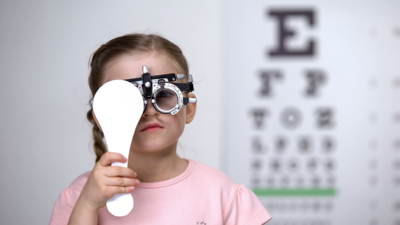Health
Debunking Myopia Myths: What You Need to Know for Healthy Vision

Myopia, commonly known as near-sightedness, affects a significant portion of the population, particularly children and young adults. As its prevalence has increased, so have the myths and misconceptions surrounding the condition. These misunderstandings can lead to unnecessary fear and stigma. In an effort to provide accurate information, Dr. Vikas Jain, Group COO of ASG Eye Hospitals, aims to clarify common myths surrounding myopia and its implications for health and lifestyle.
Understanding Myopia: Myths vs. Facts
One prevalent myth is that myopia is a disease. In reality, myopia is a routine refractive disorder, not an illness. It occurs when the shape of the eye causes light to focus in front of the retina, resulting in blurred vision for distant objects. In India, it affects approximately 30-40% of adults and can be effectively managed with glasses, contact lenses, or surgical options such as LASIK and Phakic IOLs. Although severe myopia may increase the risk of complications, regular eye checkups can help manage these risks.
Another misconception is that individuals with high myopia should avoid marriage and having children. There is no medical basis for this belief. While severe myopia (greater than -6.00 diopters) may elevate the risk of retinal issues, it does not affect fertility or family life. Children with myopic parents may be at a higher risk of developing myopia themselves, but lifestyle interventions, such as spending over two hours outdoors each day and receiving early eye examinations, can slow or delay its progression.
Dispelling Further Misconceptions
The idea that wearing glasses worsens myopia is another persistent myth. In fact, glasses help correct vision by directing light onto the retina, thus facilitating clearer sight. Avoiding glasses can lead to eyestrain, amblyopia, and poor academic performance in children. Maintaining an up-to-date prescription is essential for effective vision.
Another common belief is that myopia always worsens with age. Generally, myopia increases during childhood and stabilizes in the early 20s. While some individuals may experience further progression before adulthood, particularly those with high myopia or excessive screen time, engaging in outdoor activities and taking regular breaks from close-up tasks can help mitigate this progression. The use of myopia control lenses can also be beneficial.
Concerns about the safety of laser surgeries, such as LASIK and SMILE, are also frequently raised. However, these procedures are safe and effective for the majority of suitable candidates, with over 95% achieving improved vision. While there are risks, such as dry eyes, careful pre-surgery assessments by eye care professionals can minimize these complications.
Lastly, some believe that myopia control glasses are merely a marketing gimmick. This is not the case; such glasses are based on clinical research aimed at slowing myopia progression in children. While outcomes may vary, studies indicate that these glasses can reduce progression by 50-60% compared to standard lenses by altering how light converges within the eye. When combined with lifestyle changes, they serve as an effective tool for managing myopia.
Myopia is a common and manageable condition that does not hinder a vibrant life, whether in careers, relationships, or personal aspirations. The primary challenge lies in combating the stigma and misinformation that surround it. With accurate knowledge and interventions, such as routine eye exams and appropriate corrective options, individuals can enjoy clear vision and make informed decisions about their eye health. It is crucial to clear the misconceptions about myopia and advocate for healthy vision practices.
-

 World5 months ago
World5 months agoSBI Announces QIP Floor Price at ₹811.05 Per Share
-

 Lifestyle5 months ago
Lifestyle5 months agoCept Unveils ₹3.1 Crore Urban Mobility Plan for Sustainable Growth
-

 Science4 months ago
Science4 months agoNew Blood Group Discovered in South Indian Woman at Rotary Centre
-

 World5 months ago
World5 months agoTorrential Rains Cause Flash Flooding in New York and New Jersey
-

 Top Stories5 months ago
Top Stories5 months agoKonkani Cultural Organisation to Host Pearl Jubilee in Abu Dhabi
-

 Sports4 months ago
Sports4 months agoBroad Advocates for Bowling Change Ahead of Final Test Against India
-

 Science5 months ago
Science5 months agoNothing Headphone 1 Review: A Bold Contender in Audio Design
-

 Top Stories5 months ago
Top Stories5 months agoAir India Crash Investigation Highlights Boeing Fuel Switch Concerns
-

 Business5 months ago
Business5 months agoIndian Stock Market Rebounds: Sensex and Nifty Rise After Four-Day Decline
-

 Sports4 months ago
Sports4 months agoCristian Totti Retires at 19: Pressure of Fame Takes Toll
-

 Politics5 months ago
Politics5 months agoAbandoned Doberman Finds New Home After Journey to Prague
-

 Top Stories5 months ago
Top Stories5 months agoPatna Bank Manager Abhishek Varun Found Dead in Well









